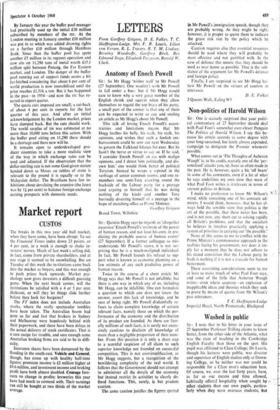Sir: Quintin Hogg says he regards as 'altogether excessive' Enoch
Powell's 'estimate of the power of human reason, and not least his own, in pre- dicting the probable oourse of human events' (27 September). If a former colleague so mis- understands Mr Powell's views, it is not sur- prising that he is a much-maligned individual. In fact, Mr Powell founds his refusal to sup- port what is known as economic planning on a low estimate of any such predictive power of human reason.
Twice in the course of a short article Mr Hogg says that Mr Powell is not infallible, but there is one way in which any of us, including Mr Hogg, can be infallible. One can formulate a question to which one does not • know the answer, assert this lack of knowledge, and be sure of being right. Mr Powell disdainfully re- fuses to claim complete knowledge of certain relevant facts, namely those on which the per- formance of the economy and the distribution of its product are founded. As there are liter- ally millions of such facts, it is surely not exces- sively cautious to disclaim all knowledge of more than a negligible proportion of their num- ber. From this 'position it is only a short step to a scornful suspicion of all claim to such superior knowledge not founded on successful competition. This is not oversimplification, as Mr Hogg suggests, but a recognition of the bewildering complexity of the real world. It follows that the Government should not attempt to administer all the details of the economy but instead restrict its activities to clearly de- fined functions. This, surely, is but prudent caution.
The same caution justifies the figures quoted in Mr Powell's immigration speech, though they are probably wrong. As they might be right, however, it is proper to quote them to indicate the grave risk run by the policy which he attacked.
Caution requires also that essential resources should be used where they will probably be most effective and not gambled with. In the case of defence this means that they should be used as near home as possible. That is the sub- stance of the argument for Mr Powell's defence and foreign policy.
Finally, I am surprised to see Mr Hogg lec- ture Mr Powell on the virtues of caution in utterance.






































 Previous page
Previous page